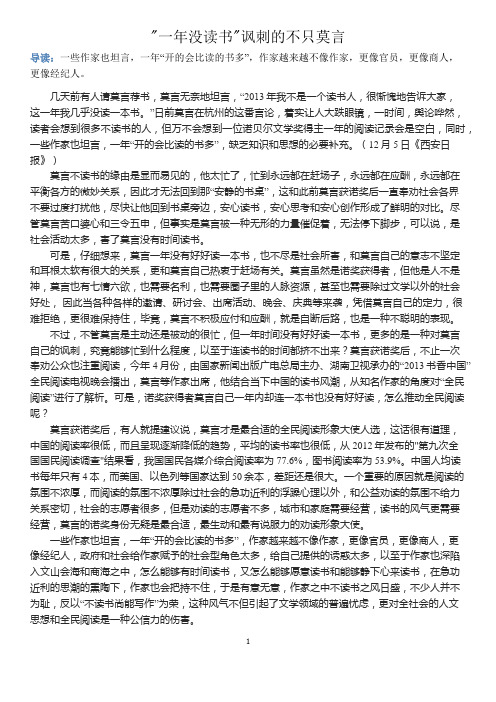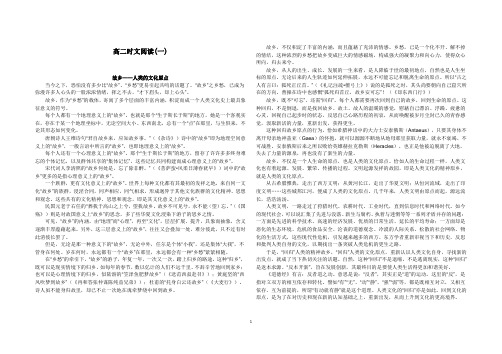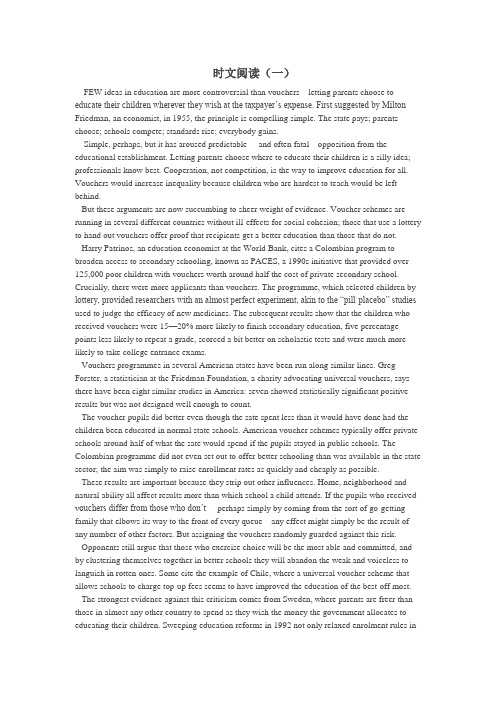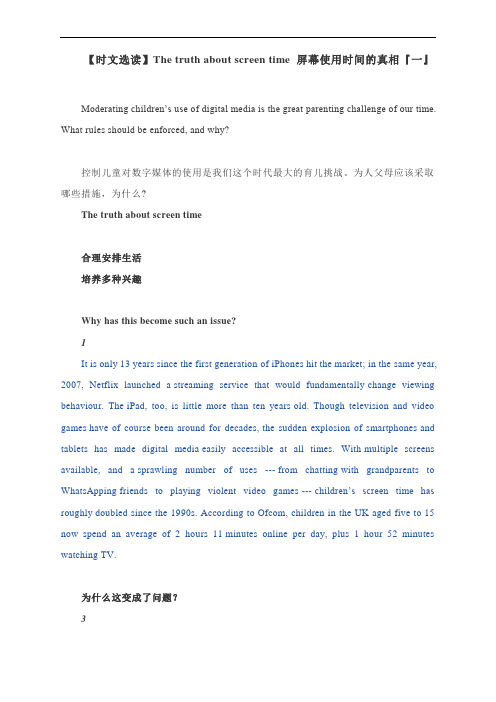时文选读两篇
- 格式:ppt
- 大小:167.50 KB
- 文档页数:15

"一年没读书"讽刺的不只莫言导读:一些作家也坦言,一年“开的会比读的书多”,作家越来越不像作家,更像官员,更像商人,更像经纪人。
几天前有人请莫言荐书,莫言无奈地坦言,“2013年我不是一个读书人,很惭愧地告诉大家,这一年我几乎没读一本书。
”日前莫言在杭州的这番言论,着实让人大跌眼镜,一时间,舆论哗然,读者会想到很多不读书的人,但万不会想到一位诺贝尔文学奖得主一年的阅读记录会是空白,同时,一些作家也坦言,一年“开的会比读的书多”,缺乏知识和思想的必要补充。
(12月5日《西安日报》)莫言不读书的缘由是显而易见的,他太忙了,忙到永远都在赶场子,永远都在应酬,永远都在平衡各方的微妙关系,因此才无法回到那“安静的书桌”,这和此前莫言获诺奖后一直奉劝社会各界不要过度打扰他,尽快让他回到书桌旁边,安心读书,安心思考和安心创作形成了鲜明的对比。
尽管莫言苦口婆心和三令五申,但事实是莫言被一种无形的力量催促着,无法停下脚步,可以说,是社会活动太多,害了莫言没有时间读书。
可是,仔细想来,莫言一年没有好好读一本书,也不尽是社会所害,和莫言自己的意志不坚定和耳根太软有很大的关系,更和莫言自己热衷于赶场有关。
莫言虽然是诺奖获得者,但他是人不是神,莫言也有七情六欲,也需要名利,也需要圈子里的人脉资源,甚至也需要除过文学以外的社会好处,因此当各种各样的邀请、研讨会、出席活动、晚会、庆典等来袭,凭借莫言自己的定力,很难拒绝,更很难保持住,毕竟,莫言不积极应付和应酬,就是自断后路,也是一种不聪明的表现。
不过,不管莫言是主动还是被动的很忙,但一年时间没有好好读一本书,更多的是一种对莫言自己的讽刺,究竟能够忙到什么程度,以至于连读书的时间都挤不出来?莫言获诺奖后,不止一次奉劝公众也注重阅读,今年4月份,由国家新闻出版广电总局主办、湖南卫视承办的“2013书香中国”全民阅读电视晚会播出,莫言等作家出席,他结合当下中国的读书风潮,从知名作家的角度对“全民阅读”进行了解析。


高二时文阅读(一)故乡——人类的文化原点当今之下,恐怕没有多少比“故乡”、“乡愁”更易引起共鸣的话题了。
“故乡”之乡愁,已成为弥漫许多人心头的一股浓浓情绪,挥之不去,“才下眉头,却上心头”。
故乡,作为“乡愁”的载体,寄寓了多个层面的丰富内涵,积淀而成一个人类文化史上最具象征意义的符号。
每个人都有一个地理意义上的“故乡”。
也就是那个“生于斯长于斯”的地方,她是一个客观实在,存在于某一个地理坐标中,无论空间大小、东西南北,总有一个“点”在那里,与生俱来,不论其形态如何变化。
唐朝诗人王维诗句“君自故乡来,应知故乡事。
”(《杂诗》)诗中的“故乡”即为地理空间意义上的“故乡”,一般言语中所言的“故乡”,也即地理意义上的“故乡”。
每个人还有一个心理意义上的“故乡”。
那个“生于斯长于斯”的地方,留存了许许多多终身难忘的个体记忆,以及群体共享的“集体记忆”,这些记忆共同构建而成心理意义上的“故乡”。
宋代词人李清照的“故乡何处是,忘了除非醉。
”(《菩萨蛮•风柔日薄春犹早》)词中的“故乡”更多的是指心理意义上的“故乡”。
一个族群,更有文化意义上的“故乡”。
世界上每种文化都有其最初的发祥之地,来自同一文化“故乡”的族群,浸淫合同,同声相应,同气相求,形成迥异于其他文化族群的文化精神、思想和观念。
这些共有的文化精神、思想和观念,即是其文化意义上的“故乡”。
民国元老于右任的“葬我于高山之上兮,望我故乡。
故乡不可见兮,永不能(望)忘。
”(《国殇》)则是对故国意义上“故乡”的思念,多了些华夏文化浸染下游子的思乡之情。
可见,“故乡”的内涵,由“地理”而“心理”,再至“文化”,层层扩展、提升,具象而抽象,含义逐渐丰厚蕴藉起来。
另外,这三层意义上的“故乡”,往往又会叠加一处,难分彼此,只不过有时此消彼长罢了。
但是,无论是那一种意义下的“故乡”,无论中外,任尔是个体“小我”,还是集体“大我”,不管身在何处、岁在何时,永远都有一个“故乡”在那里,永远都会有一种“乡愁”紧紧相随。

时文阅读(一)FEW ideas in education are more controversial than vouchers---letting parents choose to educate their children wherever they wish at the taxpayer’s expense. First suggested by Milton Friedman, an economist, in 1955, the principle is compelling simple. The state pays; parents choose; schools compete; standards rise; everybody gains.Simple, perhaps, but it has aroused predictable----and often fatal---opposition from the educational establishment. Letting parents choose where to educate their children is a silly idea; professionals know best. Cooperation, not competition, is the way to improve education for all. Vouchers would increase inequality because children who are hardest to teach would be left behind.But these arguments are now succumbing to sheer weight of evidence. Voucher schemes are running in several different countries without ill-effects for social cohesion; those that use a lottery to hand out vouchers offer proof that recipients get a better education than those that do not. Harry Patrinos, an education economist at the World Bank, cites a Colombian program to broaden access to secondary schooling, known as PACES, a 1990s initiative that provided over 125,000 poor children with vouchers worth around half the cost of private secondary school. Crucially, there were more applicants than vouchers. The programme, which selected children by lottery, provided researchers with an almost perfect experiment, akin to the “pill-placebo” studies used to judge the efficacy of new medicines. The subsequent results show that the children who received vouchers were 15—20% more likely to finish secondary education, five percentage points less likely to repeat a grade, scorced a bit better on scholastic tests and were much more likely to take college entrance exams.Vouchers programmes in several American states have been run along similar lines. Greg Forster, a statistician at the Friedman Foundation, a charity advocating universal vouchers, says there have been eight similar studies in America: seven showed statistically significant positive results but was not designed well enough to count.The voucher pupils did better even though the sate spent less than it would have done had the children been educated in normal state schools. American voucher schemes typically offer private schools around half of what the sate would spend if the pupils stayed in public schools. The Colombian programme did not even set out to offer better schooling than was available in the state sector; the aim was simply to raise enrollment rates as quickly and cheaply as possible.These results are important because they strip out other influences. Home, neighborhood and natural ability all affect results more than which school a child attends. If the pupils who received v ouchers differ from those who don’t----perhaps simply by coming from the sort of go-getting family that elbows its way to the front of every queue---any effect might simply be the result of any number of other factors. But assigning the vouchers randomly guarded against this risk. Opponents still argue that those who exercise choice will be the most able and committed, and by clustering themselves together in better schools they will abandon the weak and voiceless to languish in rotten ones. Some cite the example of Chile, where a universal voucher scheme that allows schools to charge top-up fees seems to have improved the education of the best-off most. The strongest evidence against this criticism comes from Sweden, where parents are freer than those in almost any other country to spend as they wish the money the government allocates to educating their children. Sweeping education reforms in 1992 not only relaxed enrolment rules instate sector, allowing students to attend schools outside their own municipality, but also let them take their state funding to private schools, including religious ones and those operating for profit. The only real restrictions imposed on private schools were that they must run their admissions on a first-come-first-served basis and promise not to charge top-up fees(most American voucher schemes impose similar conditions).The result has been burgeoning variety and a breakneck expansion of the private sector. At the time of the reforms only around 1% of Swedish students were educated privately; now 10% are, and growth in private schooling continues unabated.Anders Hultin of Kunskapsskolan, a chain of 26 Swedish schools founded by a venture capitalist in 1999 and now running at a profit, says its schools only rarely have to invoke thefirst-come-first-served rule----the chain has responded to demand by expanding so fast that parents keen to send their children to its schools usually get a place. So the private sector, by increasing the total number of places available, can ease the mad scramble for the best schools in the state sector(bureaucrats, by contrast, dislike paying for extra places in popular schools if there are vacancies in bad ones).More evidence that choice can raise standards for all comes from Caroline Hoxby, an economist at Harvard University, who has shown that when American public schools must compete for their students with schools that accept vouchers, their performance improves. Swedish researchers say the same. It seems that those who work in state schools are just like everybody else: they do better when confronted by a bit of competition.Altruism(利他主义), according to the text books, has two forms. One is known technically as kin selection, and familiarly as nepotism. This spreads an individual's genes collaterally, rather than directly, but is otherwise similar to his helping his own offspring. The second form is reciprocal altruism, or “you scratch my back and I'll scratch yours”. It relies on trust, and a good memo ry for favours given and received, but is otherwise not much different from simultaneous collaboration (such as a wolf pack hunting) in that the benefit exceeds the cost for all parties involved. Humans, however, show a third sort of altruism—one that has no obvious pay-off. This is altruism towards strangers, for example, charity. That may enhance reputation. But how does an enhanced reputation weigh in the Darwinian balance? To investigate this question, the researchers made an interesting link. At first sight, helping charities looks to be at the opposite end of the selfishness spectrum from conspicuous consumption. Yet they have something in common: both involve the profligate deployment of resources. That is characteristic of the consequences of sexual selection. An individual shows he (or she) has resources to burn—whether those are biochemical reserves, time or, in the human instance, money—by using them to make costly signals. That demonstrates underlying fitness of the sort favoured by evolution. Viewed this way, both conspicuous consumption and what the researchers call “blatant benevolence” are costly signals. And since they are behaviours rather than structures, and thus controlled by the brain, they may be part of the mating mind. Researchers divided a bunch of volunteers into two groups. Those in one were put into what the researchers hoped would be a “romantic mindset” by being shown pictures of attractive members of the opposite sex. They were each asked to write a description of a perfect date with one of these people. The unlucky members of the other group were shown pictures of buildings and told to write about the weather. The participants were then asked two things. The first was to imagine they had $5,000 in the bank. They could spend part or all of it on various luxury items such as a new car, a dinner party at a restaurant or a holiday in Europe. They were also asked what fraction of a hypothetical 60 hours of leisure time during the course of a month they would devote to volunteer work. The results were just what the researchers hoped for. In the romantically primed group, the men went wild with the Monopoly money. Conversely, the women volunteered their lives away. Those women continued, however, to be skinflints, and the men remained callously indifferent to those less fortunate than themselves. Meanwhile, in the other group there was little inclination either to profligate spending or to good works. Based on this result, it looks as though the sexes do, indeed, have different strategies for showing off. Moreover, they do not waste their resources by behaving like that all the time. Only when it counts sexually are men profligate and women helpful. (选自Economist, 08/02/2007)Digital books start a new chapter导读:第一代电子书并没有取得预期的成功,然而随着技术的进步,新一代电子书产品逐渐浮出水面。

【时文选读】The truth about screen time 屏幕使用时间的真相『一』Moderating children’s use of digital media is the great parenting challenge of our time. What rules should be enforced, and why?控制儿童对数字媒体的使用是我们这个时代最大的育儿挑战。
为人父母应该采取哪些措施,为什么?The truth about screen time合理安排生活培养多种兴趣Why has this become such an issue?1It is only 13 years since the first generation of iPhones hit the market; in the same year, 2007, Netflix launched a streaming service that would fundamentally change viewing behaviour. The iPad, too, is little more than ten years old. Though television and video games have of course been around for decades, the sudden explosion of smartphones and tablets has made digital media easily accessible at all times. With multiple screens available, and a sprawling number of uses --- from chatting with grandparents to WhatsApping friends to playing violent video games --- children’s screen time has roughly doubled since the 1990s. According to Ofcom, children in the UK aged five to 15 now spend an average of 2 hours 11 minutes online per day, plus 1 hour 52 minutes watching TV.为什么这变成了问题?3第一代iPhone上市到现在只有13年。

高三时文美文选编(二)1、读书,让你遇见更好的自己马想斌在快乐的猪与痛苦的思考者之间,你的选择是什么?4月23日,世界读书日。
时间赋予了读书一个礼节性的纪念,让人们能够有理由从繁忙中找个空隙,反省一下如今很少翻书的自己。
尤其是今年,李克强总理在全国两会中提出“书香社会”,一直被认为读书越来越少的这个国家,因政府首脑的政治倡议,比以往更加重视全民阅读。
尽管国人读书越来越少的消息,早已被不断增长的书籍阅读量击碎,但无可回避的是,这样的时代每一个人都很容易找到不读书的理由。
的确,如今读书对于很多人来说是很麻烦的事儿,需要付出时间,付出精力,甚至还要付出一份心境。
许多更为紧迫的事情,都会排在读书的前面。
诸如此类的理由会有很多。
在所有的理由中,时代提供了一个共性:如今人们不必再如饿狼一般猎取信息,信息自己就会扑面而来。
通过读书获取知识的旧有途径,已经被时代改造得太过容易。
那么,我们为什么还要读书?“书是人类进步的阶梯。
”而在长者与老师的言传身教中,读书赋予了获取生存知识与技能的功能,十年寒窗,一朝高考,大多是为了通过读书获取可能的好工作高收益。
但如今在高学历未必能带来高收益的现实下,读书无用论开始盛行。
不能有一个好的工作,为什么还要坚持读书?对于很多人来说,这是个问题,但早被台湾作家龙应台回答了。
龙应台写给安德烈一段话中这样表达,孩子,我要求你读书用功,不是因为我要你跟别人比成绩,而是因为,我希望你将来会拥有选择的权利,选择有意义、有时间的工作,而不是被迫谋生。
的确,书虽然不能帮我们解决所有问题,却能给我们一个更好的视角,它会在不知不觉中影响我们的思考、逻辑、谈吐、与人共事等各个方面。
读书多了,内心才不会决堤。
说到底,读书会让你遇见一个更好的自己。
(本文来源:华商报)2、不同的远方宁白看到孩子与母亲相随的画面,令人温暖。
母亲真的是孩子的第一位老师。
可是,行走街市,也总能听到母子之间冷冷的对话,其实,大多是母亲的独语。
2022高考语文时文阅读精选:香蛇对生命的渴望在圭亚那山区的村庄里,经常可见一种专门小的蛇,这种蛇无毒且性格温顺,身上还散发出诱人的香味,在几米远的地点都能够闻到,这种香味有防虫、防蚊等作用,人们都管它叫香蛇。
圭亚那属于热带雨林气候,因为自然环境多雨,气候潮湿,因此,在乡村有大量的蚊子滋生。
在这种情形下,当地人便捕捉香蛇来驱蚊。
香蛇被捉后,当地妇女就会将它的躯体卷曲起来,绞成一种漂亮的“花斑”,然后用专门的胶水洒在它身上定型,制成漂亮的耳环戴在耳朵上,既漂亮了自己又能驱逐蚊虫。
可如此却害惨了香蛇,它们不但要承担躯体被强度卷曲所带来的痛楚,更要承担化学胶水浸浊躯体所带来的疼痛,甚至要面对被饿死的境遇。
一个动物爱护组织妄图改变香蛇这一凄惨的命运,可当地人却强调他们并没有害死香蛇。
而事实也证明,许多香蛇被制成耳环后确实没有死,那么,是什么力量让香蛇在遭受如此摧残之后还活着呢?一位科学家观看到了两个细节:一是香蛇被捉后,闭上眼睛任人摆布完全不抵抗,二是它的躯体开始变干往往是从尾巴开始的。
科学家确定这是对生的期望而采取的一种躯体调剂。
不抵抗,是在储存体力;从尾巴开始变干,是要爱护躯体最重要的头部。
几天后,被捉的香蛇的躯体机能开始下降,香味也逐步消逝,当地人便会将它抛弃而查找新的香蛇。
而此刻的香蛇尽管已奄奄一息,但只要一接触地面,一接触到草叶,它就会使出最后一点力量迅速地补充食物和水,然后待在原地静养,不久后便会复原过来。
因此,许多香蛇一生被捉到好多次,但每次都能坚强地活下来。
香蛇的命运因此悲伤,但它对生的期望却给了我们深刻的启发。
面临绝境,许多人会不知不觉地选择舍弃,进而失去生命,什么缘故不学一学香蛇,努力调整自己,坚强地活下去呢?哲理:艰巨困苦,玉汝于成;宝剑锋从磨砺出,梅花香自苦寒来;忍辱负重,绝境重生.。
高职英语时文选读白冰导言白冰,一位享有盛誉的中文写作家,以其独特的文风和深入人心的作品受到广大读者的喜爱。
在高职英语教学中,引入白冰的时文作品进行选读,对学生的阅读能力和英语综合运用能力都有积极的促进作用。
本文将介绍几篇适合高职英语学生的白冰时文作品,包括《如何使用互联网》、《做一个有思想的消费者》和《亲情的力量》。
1. 如何使用互联网摘要《如何使用互联网》是白冰创作的一篇时文,主要介绍了互联网的普及和影响,并提出了一些建议以合理利用互联网。
正文近年来,互联网的飞速发展和广泛应用已经改变了我们的生活方式和工作方式。
然而,有些人对于互联网的使用方式依然存在困惑。
在这篇时文中,白冰以简洁明了的语言分析和总结了如何使用互联网。
首先,白冰指出互联网的普及已经使得信息获取变得更加便捷和快速。
如今,我们可以通过搜索引擎获取各种知识和信息,可以通过社交网络与他人进行交流和分享。
然而,白冰也提醒我们要提高对互联网信息的筛选和辨别能力,避免受到虚假信息的误导。
其次,白冰强调了互联网应用的合理性和节制性。
互联网无时无刻不在影响着我们的生活,但我们要学会控制自己对于互联网的依赖和使用。
白冰建议我们要合理安排上网时间,优先处理重要的工作和学习任务,避免被无谓的信息浪费时间和精力。
最后,白冰提出了在互联网使用中需要注意的隐私和安全问题。
在互联网上,我们会涉及到很多个人信息和隐私,所以我们要时刻保持警惕,加强自己的网络安全意识,避免个人信息泄露和受到网络欺骗。
通过阅读和理解这篇时文,我们可以更好地掌握如何正确合理地使用互联网,以提高我们的生活质量和工作效率。
2. 做一个有思想的消费者摘要《做一个有思想的消费者》是白冰撰写的一篇时文,探讨了消费者在购物时应该具备的思考和选择能力。
正文在当今消费主义盛行的社会中,人们往往会被各种各样的商品和广告所诱惑,导致盲目消费和浪费资源。
为了引导人们成为有思想的消费者,白冰撰写了这篇时文,提出了一些有关消费的建议。
杂志《时文选读》做摘抄600字8篇杂志《时文选读》做摘抄600字8篇 1窗外,桂花飘零,梧桐摇曳,就像秋天的寒露落在夏花上。
一切看起来都那么随意。
时光荏苒,岁月流逝,光阴似箭转瞬即逝,留下的只有匆忙和迷茫。
在喧嚣的世界里,一个人孤独的隐居。
哪怕他身边有太多杂念,只要你在心里种下菊花,你就会收获一份淡然与宁静。
我总是喜欢一个人倚着窗户看窗外的风景。
桂树依然芬芳,梧桐叶泛黄枯萎,花瓣和树叶落了一地。
随风起舞,街上依然是忙碌的行人。
偶尔看着远处美丽的山,还是那么雄伟,看着天上的云彩云朵,变幻无常,看着眼前的花开花落,落叶归根。
收回思绪的潮涌,转身,端起茶杯,泡一杯香茶,心中杂念搁浅;想起一件往事,拾起错过的时光;捧一本优雅的书,读一段文字,珍惜埋藏在时光深处的痴情。
流年不语,岁月忧伤。
多少心绪曾隐藏在时光的倒影中,多少轻狂的梦想埋在时光的深处。
拈一颗朴素的心,轻倚人生的转角,看流年的风从身边轻轻吹过,那么无情冷酷,带走了最美的年华,沧桑了青春的容颜,但那些昔日经历过和奋斗过的过往,那些被时光浸染的情愫,那些年我们为梦想而热血打拼的青春,始终留在记忆深处,明媚了岁月,芬芳了生命。
闻一阵花香,听微风细语。
无数心里的惆怅,像夏夜草丛中纷飞的萤火虫,闪烁着暗淡的光芒,在时间的风月里,摇曳成一树花香,芬芳成一朵嫣然,唯美成一苞花蕾,在寂静的深夜里绽放如梦。
在星如棋布的夜晚,谁曾与星星对语;在花香飘溢的时节,谁曾与树为伴,与花共舞,饮酒作诗,逍遥人生,“饮酒花树下,诗成自两行”是最美的境界阐释;在人生不如意的时期,轻语“对酒当歌,人生几何”,举杯与心灵浅酌。
杂志《时文选读》做摘抄600字8篇 2花开的一瞬不是为着相逢,而是为着不曾错过的欣喜。
为着这一刻,所以忍受分离,且不惧这分离是天各一方还是终将遥遥无期。
因着这无期在心中有期,所以甘愿等待,因着这等待而凋谢了多少季花期,所以满头青丝鬓白,岁月萧萧落地。
在我深情的话语中,你唱出了我的悲伤和无助。
【目录】卷首语梅杏半黄初夏时时文篇红学痴儒周汝昌一卷《红楼》梦一生 (02)林黛玉为什么不喜欢李商隐? (04)山东邹平县陷高利贷漩涡总规模达1000亿元 (06)迟到被拒VS提前收卷:最严高考咋做到最公平? (10)如何对待无礼之辈?——南海争端求解,不如问孔子 (13)崔永元怒斥湖南教育厅:不努力不作为不要脸 (14)哦,端午节 (14)端午节轶事 (16)美文篇时间没有等我,是你忘了带我走 (17)天地合,乃敢与君绝 (19)与君初相识,犹如故人归 (21)衣带渐宽终不悔,为伊消得人憔悴 (24)佛家四大经典爱情故事 (27)一代才女李清照的失乐园 (30)心灵的篝火 (31)双琴祭 (32)荷叶 (33)耳边杜鹃啼 (34)柴禾 (35)插辫子 (36)太阳梦 (37)被时间决定的讲述 (38)老钱的灯 (39)饭桌上的真味 (40)浑厚高华栀子花 (41)麦香醉田野 (42)莲香清露醉石城 (43)听雨品茶谈读书 (45)例文篇双月湖记游女舍记双休 (47)江泉城游记停电记孙杨传文言课堂吾弟传午休小记 (48)忘忧山起名记赏花吾家小弟传观荀子像买药记鬼才传 (49)芝诺传吾母传午休小记圣人传周景舜自传李树敏传刘瑶传 (50)孙邵卿传吴振基传大惊之事宝泉寺碑记灭蚊记蚊 (51)矬子传小思村东小学游记临沂十八中记班副传 (52)宝山停水记夜半遇鬼记付丽臻自传红山游记 (53)蛊与盗晚休记吾之好友付丽雯自传寒山寺游记 (54)◆时文篇◆红学痴儒周汝昌一卷《红楼》梦一生著名红学家周汝昌逝世生前嘱咐不开追悼会不设灵堂据周汝昌女儿周伦玲消息,我国著名红学家、古典文学专家、诗人、书法家周汝昌先生于5月31日凌晨1点59分于家中去世,终年95岁。
周汝昌是继胡适等诸先生之后,新中国研究《红楼梦》的第一人,享誉海内外的考证派主力和集大成者。
周伦玲说,按照父亲遗愿,不开追悼会,不设灵堂,让他安安静静地走。
周汝昌生平红楼考证派主力和集大成者我国著名红学家、古典文学专家、诗人、书法家周汝昌先生于昨天凌晨1点59分于家中去世,终年95岁。